Teachers' Day: My Parallel Journey as a Teacher
A tribute to the pillars of society by one who has been more than just a civil servant.

Why the 5th of September?
On the 5th of September every year, commonly celebrated as Teacher's Day, the vast expanse of India resonates with heartfelt gratitude, marking the illustrious birth anniversary of its philosopher-President, Dr. S. Radhakrishnan. This day isn't just a mere date on the calendar; it serves as a profound testament to the enduring significance of the teaching profession. A harmonious blend of tradition and modernity, it prompts us to pause, reflect, and deeply appreciate the pivotal role teachers have continuously played in shaping the intellectual and moral fabric of our society. Through this celebration, we are reminded that educators aren't merely transmitters of knowledge, but torchbearers of values, architects of character, and catalysts of societal transformation.
Teachers: From Yore to Today
Since ancient times, the significance of teachers has been unparalleled. The Guru-shishya parampara or the teacher-student tradition of ancient India underscores the veneration with which educators were regarded. The teacher, or "Guru", was often placed on a pedestal, revered not just for imparting knowledge but for shaping the character and future of the disciple.
Fast forward to today, and the role of teachers has only evolved. Their responsibilities have broadened, their influence is widespread, and their challenges are more multifaceted. Yet, their essence remains – to enlighten, empower, and elevate.

The Quintessence of the Bhagavad Gita
The Bhagavad Gita, our ancient and sacred luminary in the pantheon of Indian scriptures, paints a vivid tableau of the symbiotic relationship between Lord Krishna and Arjuna, offering an epitome of the profound teacher-student dynamic. Lord Krishna is not just an archetypal mentor; he embodies the essence of enlightenment and wisdom. He ventures beyond mere instruction, becoming a beacon of inspiration, guiding Arjuna through the intricate labyrinths of doubt and despair. More than dispensing knowledge, Krishna unravels the tapestry of Arjuna's inner psyche, igniting the latent spark within and catalyzing his journey of self-discovery.
Similarly, an exemplary teacher, in the grand amphitheatre of learning, doesn't merely disseminate information; they weave a tapestry of curiosity, fostering a milieu where the heart's passion intertwines with the mind's pursuit. Such a pedagogue transforms the realm of education, shifting the emphasis from the mundanity of rote memorisation to cultivating an insatiable love for learning and exploration.
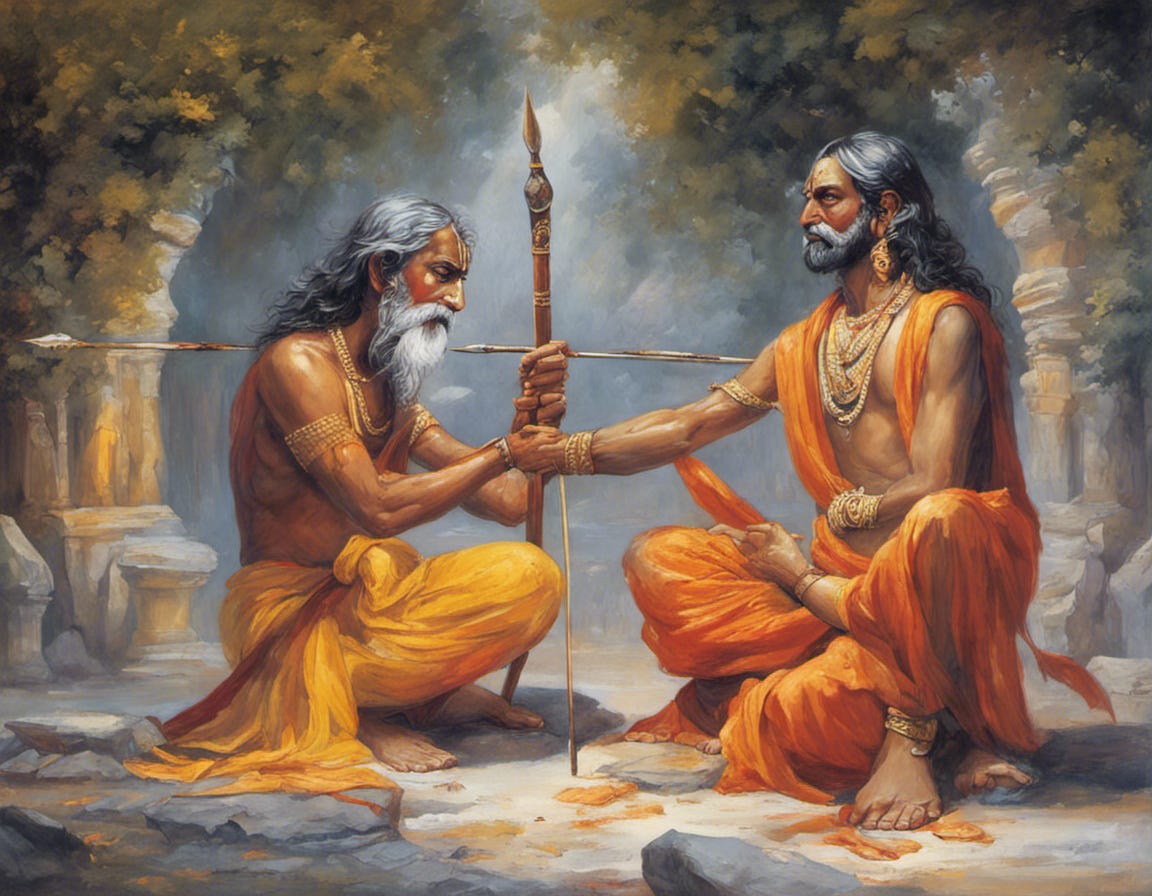
Eklavya: A Testament to Self-Study
The compelling saga of Eklavya, etched in the annals of ancient Indian epics, unfurls a multi-layered narrative. It is not merely a story; it's a tapestry interwoven with themes of sacrifice, dedication, and the costs of unbending traditions. At its heart, Eklavya epitomises the pinnacle of discipleship — a student whose unwavering devotion led him to offer his thumb as "gurudakshina", an act of reverence towards his teacher. Yet, this heart-rending sacrifice also casts a somber shadow, underscoring the need to critically evaluate and, at times, challenge long-standing customs that demand undue retribution. In stark juxtaposition to this tale of supreme sacrifice stands Eklavya's tenacity for self-study and self-training, which beautifully encapsulates the essence of autodidacticism.
Fast forward to our contemporary age, the digital renaissance, marked by the omnipresence of tools like Google, ChatGPT4, and a plethora of online repositories, has revolutionised the learning landscape. The barriers to knowledge have crumbled, making self-directed learning not just an abstract ideal but an accessible reality. However, amidst this digitised maze of information, the value of human mentorship remains paramount. For while machines and algorithms can provide data, it's the compassionate touch, the discerning eye, and the nurturing soul of a teacher that transforms this data into wisdom, grounding the process of learning in the rich soils of humanity and empathy.
Teacher Vs. Tutor: The Subtle Distinction
A tutor imparts knowledge, ensures understanding, and evaluates progress. However, a teacher transcends these tasks. They mentor, shape character, cultivate ethics, and inspire a thirst for knowledge. In essence, while a tutor touches the mind, a teacher touches the soul. They not only provide the map but also ignite the flame of exploration within their students, encouraging them to seek beyond the horizon and question the world around them. Confucius aptly stated, "The essence of knowledge is having to apply it." Such is the profound impact of a genuine teacher; they instill in students the desire not just to learn, but to live the learning, making it an integral part of their very being.
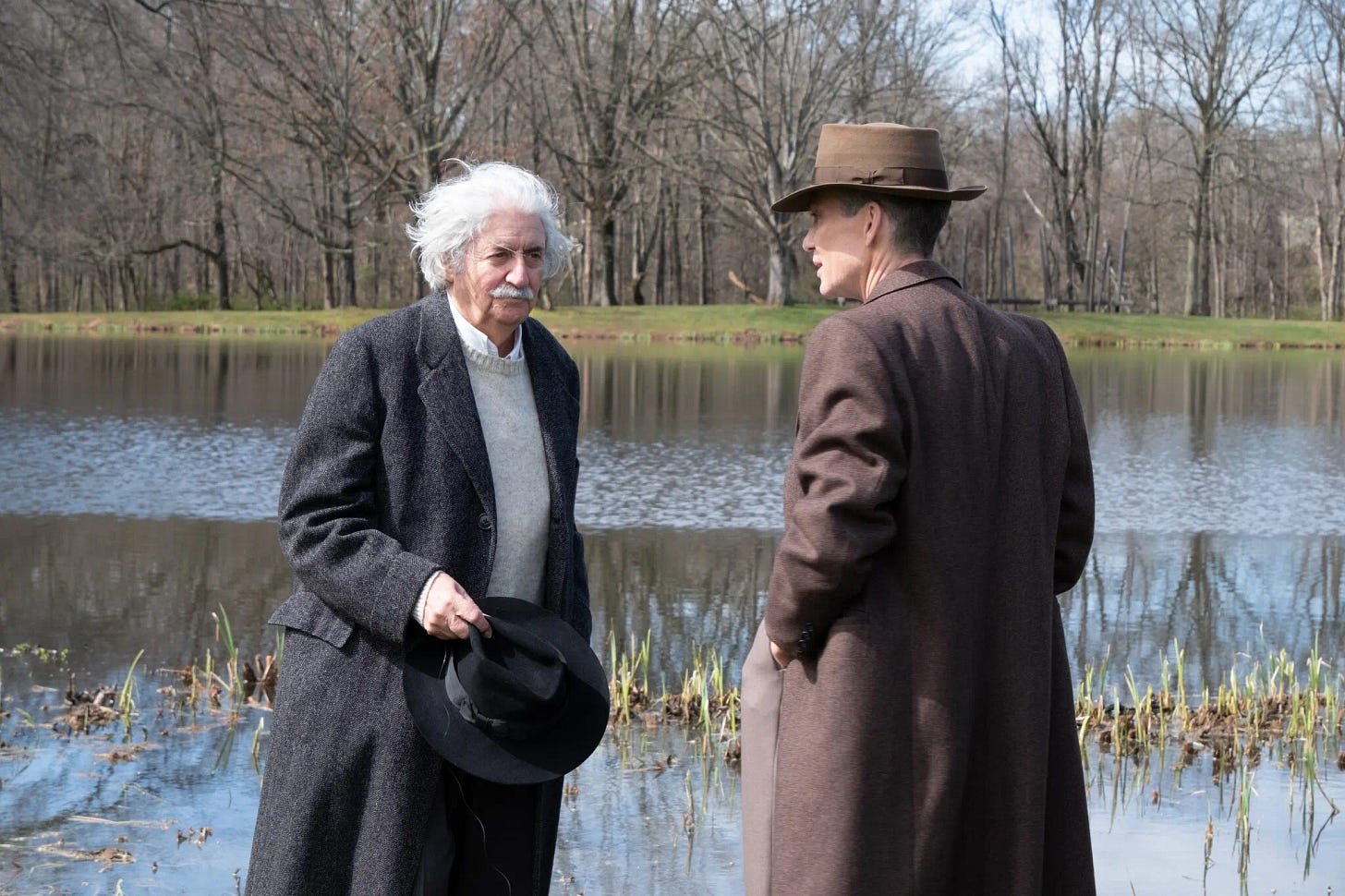
The Oppenheimer Dilemma
J. Robert Oppenheimer, the subject of the film “The Oppenheimer Dilemma,” highlights the ethical tightrope that accompanies potent knowledge. Known for pioneering the atomic bomb, his story serves as a cautionary tale about the risks of divorcing knowledge from ethics. This moral dilemma isn't just Oppenheimer's; it's a challenge for educators too. The goal is not merely to pass on information but also to ensure it's used responsibly. Teachers light the way but must also foster discernment in their students.
Ignoring the ethical side of education is risky. Knowledge, without moral guidance, can turn destructive. Oppenheimer’s life reminds us that while knowledge is power, ethics provide its proper use. Both teachers and learners are accountable for using knowledge wisely, to ensure it serves humanity, not harms it.
Eloquence in Action: Gleaning Wisdom from Shakespeare
William Shakespeare, with his unparalleled insight into the human psyche, once eloquently expressed, "Action is eloquence." This aphorism extols the virtues of experiential learning, highlighting the primacy of hands-on experience over abstract theorisation. Yet, in a poignant reflection in "The Merchant of Venice", he muses, "I'd easier teach twenty what were good to be done than be one of the twenty to follow mine own teaching." It was through the evocative verses of this very play that we, as students of Yadavindra Public School, Patiala, were initiated into the world of the Bard of Avon.
The dichotomy in these Shakespearean insights underscores a profound truth in the realm of education. While a teacher's role is undeniably pivotal in furnishing the tools of knowledge, it's the onus of the student to navigate and carve their own journey, wielding these tools with discernment. The hallmark of a truly accomplished teacher is the celebration of a student's achievements, often surpassing their own, because, at its heart, education is not a destination but a ceaseless journey. Each dawn heralds new lessons, new insights, ensuring that the quest for knowledge remains an eternal, evolving odyssey.
Passing the Torch: A Unique Tradition at YPS, Patiala
At Yadavindra Public School (YPS) in Patiala, a distinctive tradition captured the very essence of Teacher's Day. As a mark of respect and appreciation, the senior-most students donned the mantle of educators, guiding and teaching their junior counterparts, while our cherished teachers retreated to the staff-room, immersing themselves in camaraderie and rejuvenating over cups of tea. This practice was ingenious not only as a symbolic gesture of gratitude but also as an avenue for seniors to experience the responsibilities and joys of teaching, fostering a sense of empathy and appreciation for their mentors.
However, life often has its unique way of scripting narratives. The twist in my tale was that when the baton was to be handed to us, destiny decided to play its cards differently1. To our collective dismay, the 5th of September that year coincidentally fell on a Sunday, denying us the much-anticipated opportunity to step into the shoes of our educators. The universe's sense of timing, on this occasion, was bittersweet, to say the least.
Navigating Academic Halls: From YPS to Thapar Institute of Engineering and Technology, Patiala
From the nurturing grounds of Yadavindra Public School, Patiala, where I embarked on my formative educational journey between 1967 and 1977, to the vibrant and intellectually rich atmosphere of Multani Mal Modi Degree College, Patiala (1977-79), each step of my academic odyssey was filled with indelible moments of enlightenment. My voyage of discovery continued at the distinguished Thapar Institute of Engineering and Technology, Patiala, from 1979 to 1983. At Thapar, renowned for its stringent academic standards, I was not only furnished with a robust analytical and conceptual framework but also bestowed with the unique opportunity to teach for a year (1983-84) while preparing for the Civil Services Exam.
The Fall semester presented an enriching challenge as I found myself instructing a course on "Microwave Techniques" to final-year students, some of whom were friends just a year my junior. This was in addition to supervising the usual laboratory sessions. Among those students was an outstanding fresher who would later achieve the remarkable distinction of serving as the Chief Secretary of Punjab. The Spring Semester, following my completion of the UPSC written exams in November 1983, was a more relaxed experience. During this period, I took great pleasure in teaching 'Materials Science' to the bright young minds of the third year, an experience made all the more enjoyable because it intersected with my favorite subject, Physics.
These academic citadels were more than mere brick-and-mortar structures; they served as transformative crucibles that shaped my intellect, instilled enduring values, and profoundly impacted the person I have become today.
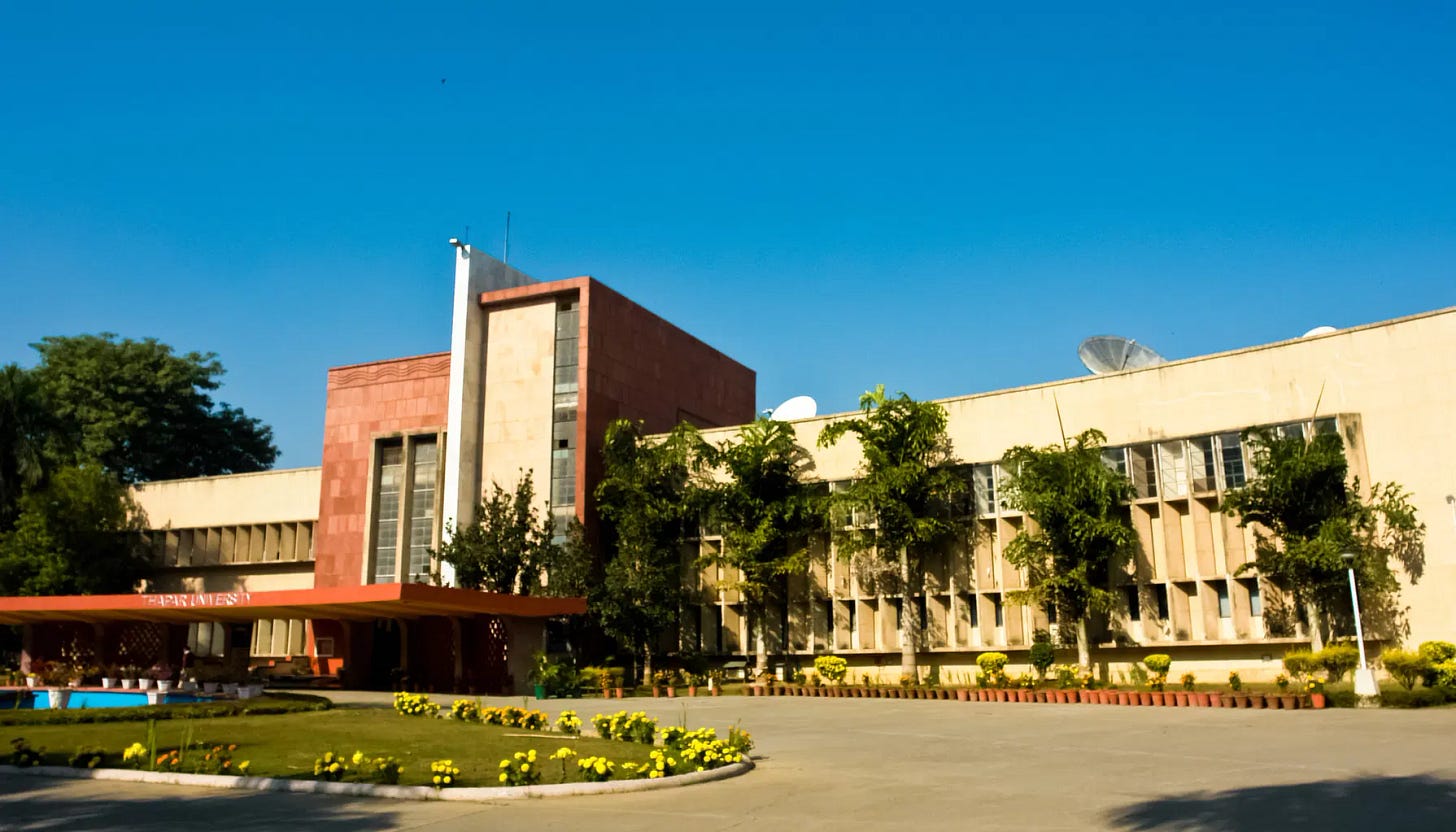
Student as well as a teacher in the IAS
Stepping into the august precincts of the Indian Administrative Service on 21st August 1984 marked a monumental turning point in my life—a transition from a student to a steward of public welfare. Representing the Punjab cadre, I embarked on a journey filled with passion and commitment that continued unswervingly until my retirement on 31st July 2021.
My First Love, My First Book
In August 1986, shortly after completing a rigorous two-year training program, I was posted as the SDM of Samrala in Ludhiana district. Though the training program had equipped me with crucial practical skills, I quickly realized that mastering the nuanced complexities of field-level civil administration was a separate challenge altogether. Frustrated, I confided in a senior officer, lamenting the absence of a ready reckoner or handy manual for new sub-divisional magistrates. His response was simple yet transformative: "Why don't you write one?" Inspired, I authored the treatise "Sub-Divisional Magistrate: a Multi-Functional Authority," which earned the distinction of becoming an official publication by the Government of India's Department of Personnel and Training (DOPT) in the year 1989. Though it has never been revised, I am gratified to hear that it remains a foundational text for incoming IAS trainees nationwide, providing guidance as they commence their journey at the Lal Bahadur Shastri National Academy of Administration (LBSNAA) in Mussoorie after successfully passing the Union Public Service Commission's IAS Exam. Those interested in more details may refer to the link provided in the footnote below2.
MGSIPA, my last love
Among the myriad roles I've embraced during my career in the Indian Administrative Service, my tenure as Director-General of the Mahatma Gandhi State Institute of Public Administration, Chandigarh holds a special place in my heart. This wasn't merely an administrative assignment but a valedictory platform for transformative change—my swan song before my superannuation from the IAS. This role provided a unique blend of responsibilities: not only training new recruits to the State Civil Services but also offering in-service training at various levels, operating an IAS Coaching Centre for aspirants, and spearheading groundbreaking initiatives.
Our collaborations extended well beyond our geographical confines. We formalized a Memorandum of Understanding (MOU) with LBSNAA Mussoorie for training promoter IAS officers across different cadres. Engagements with Singapore’s Chandler Institute of Governance and South Korea's Civil Services Training Institute elevated our international profile. We also joined forces with the National Defence College for an integrated training program catering to military and civil officers as well as international delegates. An alliance with the Ministry of External Affairs facilitated specialized programs for emerging and seasoned Indian Foreign Service officers. Furthermore, we launched programs for section officers of the Government of India and conducted joint training initiatives with civil servants from Bangladesh. We even inked an MOU with the National Institute of Smart Governance in Hyderabad.
This enumeration of partnerships goes beyond mere name-dropping; it serves as irrefutable evidence of our collective endeavor to metamorphose the institute from what was essentially an administrative training school into an esteemed institution with both national and international acclaim. These collaborative triumphs not only mark the crowning achievement of my IAS career but also form a chapter filled with well-earned pride and deep fulfillment. Set amid the picturesque and sprawling grounds of Punjab Government’s Mahatma Gandhi Institute of Public Administration in Chandigarh, I found both literal and metaphorical satisfaction in the final laps of my IAS marathon. During the COVID lockdown days, my favorite walking circuit around the campus served as a physical manifestation of this journey—each step not only fulfilling but also imbued with a sense of exhilarating accomplishment.
The Obligation to Disseminate
Learning is not just an act of personal enrichment but also carries an obligation: to give back, to disseminate the acquired knowledge. While one might appreciate the significance of copyrights, intellectual property rights, and patents in the business realm, at the heart of our human essence lies the principle of sharing and teaching. As we have been mentored by those who sought nothing in return but our sincere gratitude, it's incumbent upon us to pay it forward. That act of teaching, of sharing, becomes our most indelible legacy.
Redefining the Essence of Teaching: Beyond G.B. Shaw's Adage
In conclusion, the often-quoted adage by G.B. Shaw, "Those who can, do; those who can't, teach," must be contextualized and understood as more of a provocation than a dictum. True teaching transcends mere instruction—it lives in the application of knowledge, in the courage to challenge the status quo, and in the never-ending pursuit of personal and collective growth. It's not sufficient to merely answer questions that arise; it is just as vital to question the answers we've grown comfortable with. As we sail across the boundless sea of knowledge, it is imperative that we continuously "question the axioms" that underlie our understanding of the world.
A Grateful Ode to My Life's Teachers: From Classroom to Bureaucracy
As I reflect on my journey, from the classrooms of Yadavindra and Thapar to the complex corridors of the Indian Administrative Service, it becomes overwhelmingly clear that this voyage has been enriched by the wisdom and mentorship of countless teachers. Each one has left an indelible mark on my soul, and for that, I am eternally grateful. So here's to all the teachers, in classrooms and beyond, who inspire us to keep questioning, keep learning, and keep growing. The torch you've lit in us will shine on, as we pass it forward in this everlasting cycle of learning. Thank you for showing us the way, for the journey—and the learning—must go on.
REQUEST: If you enjoyed this article from 'The KBS Chronicle', we encourage you to share it with others who might also find it valuable.
Click the link below to access easy sharing options for Twitter, Facebook, and Email. The same link also generates a web-link that can be shared via messaging apps like WhatsApp, Telegram, or Signal, in both individual and group settings.
Thank you for your support.
A Symphony of Steps: India's Quartet and Our Exhilarating Sprint
A Symphony of Steps: India's Quartet and Our Exhilarating Sprint In the dynamic atmosphere of the World Athletics Championships held in Budapest, the stadium pulsed with electric anticipation and fervour. As nations converged upon the grand stage, a mesmerising tapestry of narratives began to unfol…
https://docs.google.com/document/d/1u7Dh21EEeArsAA2kFKm2yQEsJzYRaJgP/edit?usp=sharing&ouid=106723119440784079081&rtpof=true&sd=true



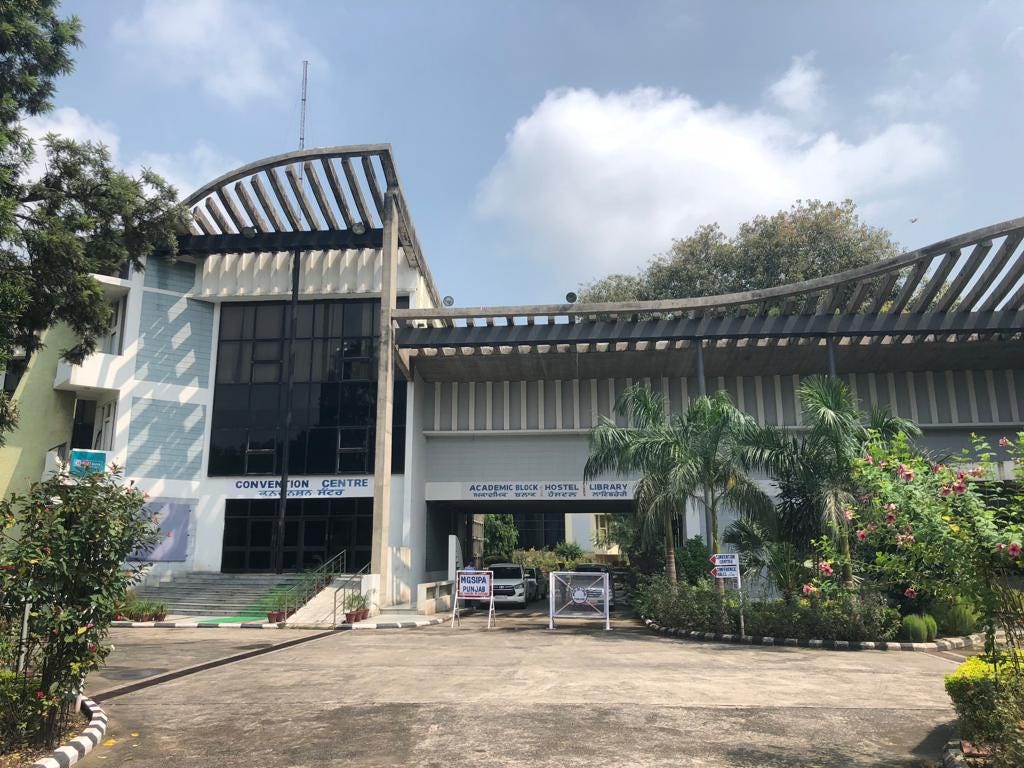
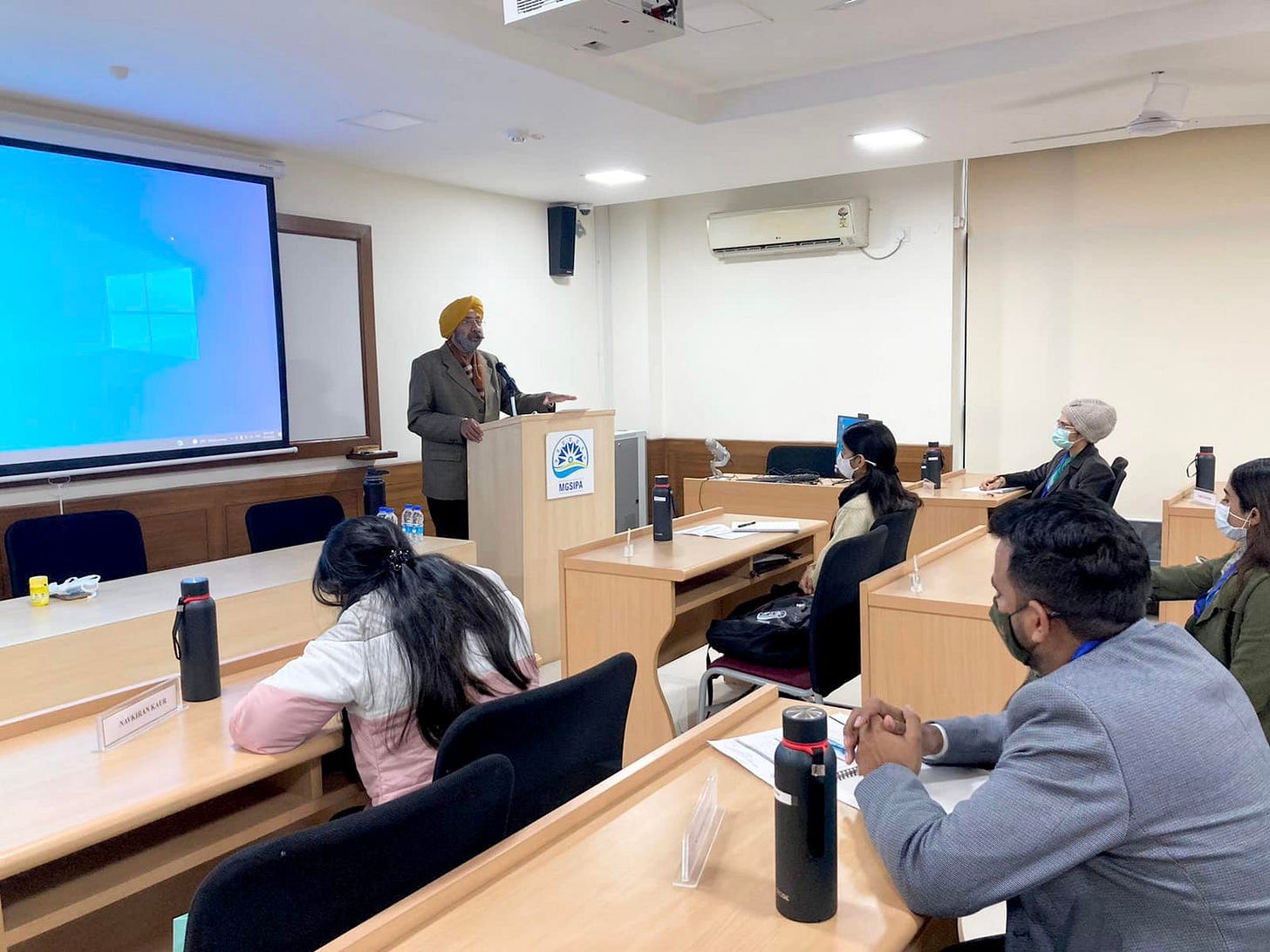
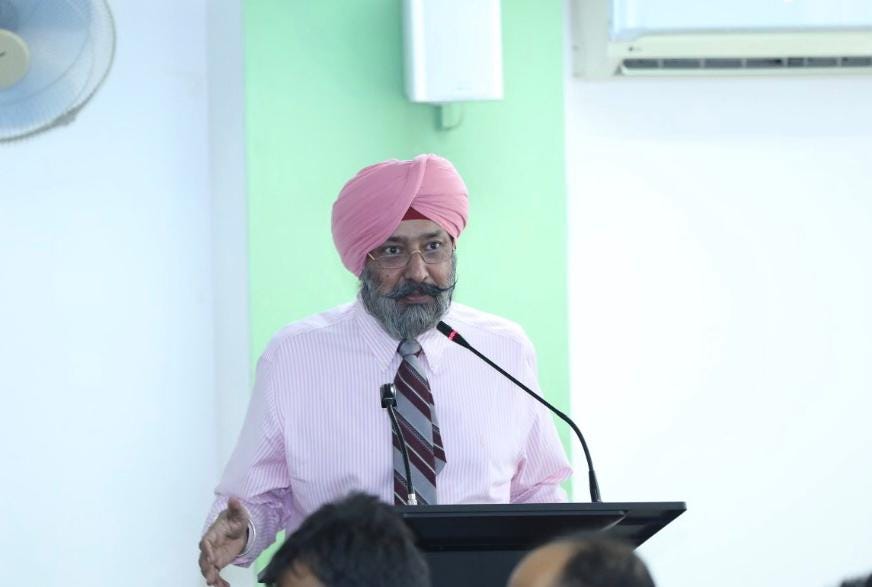

Congratulations on special article on Teacher’s Day…!! How refreshing are memories both as student and teacher…!!🌹🌹